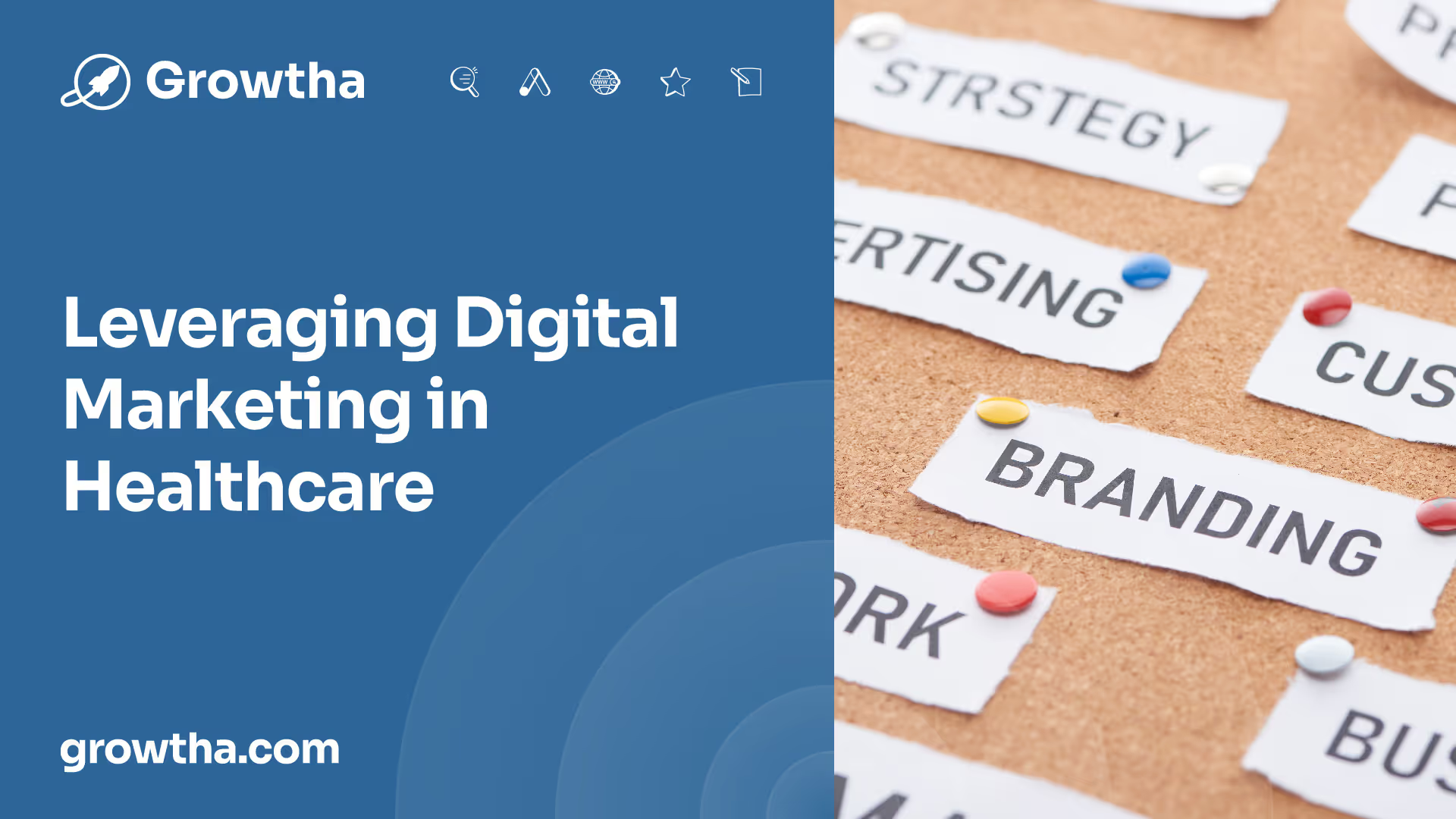Why Your Brand Strategy is Essential to Your Healthcare Digital Marketing Success
To succeed in healthcare marketing, having a well-defined brand strategy is essential.


Why Your Brand Strategy is Essential to Your Healthcare Digital Marketing Success
Importance of Brand Strategy in Healthcare Marketing
To succeed in healthcare marketing, having a well-defined brand strategy is essential. Healthcare marketing, an interdisciplinary field that utilizes concepts and techniques specific to classical and social marketing, aims to improve the image of a healthy population, detect and treat individuals with chronic illnesses, and promote social reintegration.
Healthcare Marketing Overview
Healthcare marketing involves promoting healthcare services, facilities, and organizations to attract and retain patients. It encompasses various strategies and tactics to effectively communicate the value and benefits of healthcare offerings to the target audience. By employing marketing techniques, healthcare providers can reach and engage with patients, build trust, and increase patient satisfaction.
The Role of Brand Strategy
In the highly competitive healthcare industry, brand strategy plays a vital role in differentiating your healthcare brand from competitors. It focuses on creating a well-differentiated, memorable, and unique proposition that sets your brand apart from others [1].
Brand differentiation is the process of distinguishing your healthcare facility brand in a way that builds a unique identity and value proposition in the minds of your target audience and prospective patients. It is about giving patients a compelling reason to choose your brand over others and making your brand memorable and remarkable.
By developing a strong brand strategy, healthcare providers can establish a positive brand image, enhance credibility, and foster patient loyalty. A well-crafted brand strategy helps attract new patients, retain existing ones, and build long-term relationships based on trust and satisfaction.
In addition to differentiation, brand strategy also encompasses elements such as brand positioning, brand messaging, and brand identity. These elements contribute to the overall perception of your healthcare brand and help shape the patient experience. Consistency in brand messaging and visual identity across various touchpoints is crucial for reinforcing brand recognition and building trust among patients.
In the digital age, brand strategy extends beyond traditional marketing channels. With the rise of digital marketing in healthcare, a strong brand strategy is essential for effective online presence and engaging with patients through digital platforms. It ensures that your brand's message remains consistent across different online channels, such as websites and social media.
In conclusion, a well-defined brand strategy is vital for healthcare marketing success. By differentiating your brand, establishing a unique value proposition, and effectively communicating your brand's identity, you can attract and retain patients, foster loyalty, and build a strong reputation in the healthcare industry.

Differentiating Your Healthcare Brand
In the competitive landscape of healthcare, it is crucial to differentiate your brand from competitors in order to attract and retain potential patients. Brand differentiation involves creating a unique identity and value proposition that sets your healthcare facility apart from others. By implementing effective brand differentiation strategies, you can establish a memorable brand identity that resonates with your target audience and prospective patients.
Brand Differentiation Strategies
To effectively differentiate your healthcare brand, it is important to understand your target audience and tailor your services and brand messaging to meet their needs and preferences [2]. Conducting surveys, holding focus groups, or engaging in conversations can provide valuable insights into your audience's expectations and help you develop unique selling points.
Here are some key brand differentiation strategies to consider:
- Specialized Expertise: Highlighting the specialized knowledge, skills, and experience of your healthcare professionals can set your brand apart. Emphasize the unique qualifications and certifications that your team possesses, demonstrating your commitment to delivering exceptional care.
- Innovative Technologies: Showcasing the use of cutting-edge technologies and medical advancements can position your brand as a leader in the industry. Highlight any state-of-the-art equipment or innovative treatment approaches that differentiate your healthcare facility from others.
- Patient-Centric Approach: Focusing on providing personalized and patient-centric care can distinguish your brand. Tailor your services to meet individual patient needs, promoting a compassionate and caring environment that goes beyond the standard healthcare experience.
- Exceptional Customer Service: Delivering exceptional customer service can leave a lasting impression on patients. Train your staff to provide attentive, empathetic, and responsive care, ensuring that patients feel valued and supported throughout their healthcare journey.
Creating a Memorable Brand Identity
Crafting a memorable brand identity is essential for differentiating your healthcare brand in both physical and online presence. Consider these key elements when creating your brand identity:
- Visual Identity: Develop a visual identity that stands out and reflects your brand's personality and values. Avoid mimicking competitors' color schemes and logos. Consistency is important across all marketing materials to reinforce brand recognition.
- Brand Storytelling: Use compelling storytelling to communicate your brand's values, mission, and unique qualities. Share success stories, testimonials, and patient experiences that highlight the positive impact your healthcare facility has made on their lives.
- Clear Brand Messaging: Develop clear and concise brand messaging that communicates your unique value proposition. Use language that resonates with your target audience, conveying the benefits and advantages of choosing your healthcare brand.
By implementing effective brand differentiation strategies and creating a memorable brand identity, you can establish a strong position in the healthcare market, attract patients, and build long-lasting relationships based on trust and quality care.

Leveraging Digital Marketing in Healthcare
In today's digital age, leveraging digital marketing strategies is crucial for healthcare organizations to maximize efficiency, generate higher return rates, and effectively engage consumers. With billions of dollars being spent on digital marketing in the healthcare industry, it's clear that digital platforms play a significant role in reaching and connecting with patients.
Essential Components of Digital Marketing
To ensure successful digital marketing in healthcare, it's important to consider the following essential components:
- Mobile-Friendly Websites: Having a mobile-friendly and responsive website is essential. More than 80% of patients use smartphones to find doctors, and mobile-friendly websites tend to rank higher on search engines like Google, making it easier for potential patients to discover and engage with your healthcare organization.
- Search Engine Optimization (SEO): Optimizing your website for search engines is crucial for improving visibility and attracting organic traffic. By incorporating relevant keywords, creating quality content, and optimizing meta tags, titles, and descriptions, your healthcare organization can rank higher in search engine results and increase the chances of being found by patients seeking your services.
- Online Reputation Management: Nearly 60% of consumers consider physician rating websites important when choosing a doctor. This highlights the significance of actively managing your online reputation. Encouraging positive patient reviews and addressing any negative feedback promptly can help build trust and influence patient decisions [3].
- Social Media Engagement: Active social media presence can increase brand awareness, attract new patients, and generate revenue for healthcare practices. By advertising services, sharing informative content, and engaging with followers, your organization can establish a strong online presence and foster meaningful connections with potential patients [3].
- Analytics and Artificial Intelligence: Implementing analytics and artificial intelligence tools can provide valuable insights into patient data, predict patient behavior, and enhance direct-to-consumer marketing efforts. By leveraging these technologies, healthcare practices can deliver more personalized and effective marketing campaigns, contributing to practice growth in the digital age [3].
By incorporating these essential components into your healthcare digital marketing strategy, you can effectively reach and engage with your target audience, build brand awareness, and drive patient acquisition and growth. Digital marketing provides healthcare organizations with powerful tools to connect with patients, showcase their services, and establish a strong online presence in today's competitive healthcare landscape.
Building Brand Awareness in Healthcare
To succeed in healthcare digital marketing, building brand awareness is essential. This involves establishing a strong online presence and engaging with your target audience through social media. Let's explore these two important strategies in more detail.
Establishing Online Presence
As patients increasingly turn to the internet to find healthcare providers, it has become crucial for healthcare practices to have a strong digital presence. According to Forbes, having a mobile-friendly and responsive website is essential. More than 80% of patients use smartphones to find doctors, and mobile-friendly websites tend to rank higher on search engines like Google.
Creating an informative and user-friendly website allows potential patients to learn about your services, specialties, and expertise. It's important to showcase your practice's unique qualities and value proposition to differentiate yourself from competitors. Including patient testimonials and reviews can also help build trust and credibility.
Additionally, online reputation management plays a vital role in influencing patient decisions. Around 60% of consumers consider physician rating websites important when choosing a doctor. Monitoring and actively managing your online reputation can significantly impact patient acquisition and practice growth.
Social Media Engagement
Active social media presence can greatly contribute to brand awareness, new patient acquisitions, and revenue for healthcare practices. Strategies such as advertising services, posting informative content, and engaging with followers can help establish your practice as a trusted source of healthcare information.
Social media platforms provide an opportunity to share valuable content, educate your audience, and promote your services. By consistently posting relevant and engaging content, you can position your practice as an authority in your field. Responding to comments, messages, and reviews in a timely manner shows that you value patient engagement and fosters a sense of connection.
It's important to identify the social media platforms where your target audience is most active and tailor your content accordingly. For example, Facebook might be ideal for reaching a broader audience, while Instagram could be more effective for visual-oriented content. By understanding your audience's preferences, you can create content that resonates with them and encourages engagement.
Implementing a well-rounded digital marketing strategy that includes both website optimization and social media engagement can significantly enhance your brand awareness in the healthcare industry. By effectively utilizing these strategies, you can attract potential patients, build trust, and ultimately drive practice growth.
Consistency in Healthcare Branding
Consistency in branding is crucial for healthcare organizations to establish a strong and recognizable brand identity. It fosters trust among patients, reinforces the distinctiveness of the brand, and plays a vital role in overall healthcare marketing success.
Importance of Consistent Branding
Consistency in branding across all channels is key in fostering trust and reinforcing a brand's distinct identity. When patients encounter a consistent and unified brand experience, it helps create a sense of familiarity and reliability. This consistency extends beyond just using the same colors and fonts; it involves maintaining a constant brand identity and message across various marketing channels [4].
Consistent branding enables healthcare organizations to build recognition and trust with their audience over time. It ensures that patients can easily identify and differentiate the brand from competitors. By consistently conveying the brand's personality, values, visual elements, and messaging, healthcare organizations can establish a strong connection with their target audience.
Strategies for Brand Consistency
To maintain consistency in healthcare branding, organizations can implement various strategies:
- Develop a Brand Style Guide: Creating a brand style guide helps establish guidelines for the consistent use of logos, colors, fonts, and imagery across all marketing materials. It ensures that everyone involved in creating content for the organization adheres to the same visual standards.
- Automate Content Creation: Utilizing branded templates and automated content creation tools can help healthcare organizations maintain uniformity in messaging, visuals, and tone. By automating the content creation process, organizations can ensure that every piece of content aligns with the established brand guidelines.
- Establish Brand Guidelines: Clearly defining the brand's values, mission, and voice helps maintain consistency in messaging. Brand guidelines provide a framework for employees and external partners to follow, ensuring that all communication remains consistent and aligned with the brand's identity.
- Consistent Social Media Marketing: Planning social media topics around core values and areas of the organization that the audience wants to hear about can help maintain consistency in social media marketing. Setting up a social media brand guide with templates ensures that the brand identity is maintained on different social media platforms.
- Email Marketing Consistency: Setting up email templates that include approved designs and sections for various content types, such as news, events, product launches, and social media outreach, ensures a consistent format and brand appearance in emails [5].
By implementing these strategies, healthcare organizations can maintain consistent branding, establish a strong brand presence, and effectively communicate their unique value proposition to patients across various marketing channels.
Aligning Brand Strategy with Digital Marketing
To achieve success in healthcare digital marketing, it is essential to align your brand strategy with your digital marketing efforts. The relationship between branding and digital marketing plays a crucial role in establishing a strong online presence and effectively reaching your target audience.
The Relationship Between Branding and Digital Marketing
Your brand strategy provides the roadmap for building and growing your brand, while your digital marketing strategies serve as the vehicle for executing and amplifying the core elements of your brand. Your brand's core values, positioning, and essence should drive your marketing efforts, ensuring that they resonate with your target audience [6].
Digital marketing offers healthcare organizations numerous channels and platforms to connect with their audience, including websites, social media, email marketing, and search engine optimization (SEO). By aligning your brand strategy with digital marketing, you can create a cohesive and consistent experience for your audience across all touchpoints.
Integrating Messaging Across Channels
Consistency in branding across all channels is key in fostering trust and reinforcing a brand's distinct identity. It is essential to maintain uniformity in messaging, visuals, and tone to avoid customer confusion. By utilizing branded templates and adhering to brand guidelines, you can ensure that your messaging remains consistent across various digital marketing channels.
Crafting engaging brand stories and integrating messages across channels is another effective way to build and grow a healthcare brand. By aligning digital channels, you can establish a robust online presence that nurtures consumer loyalty and creates more opportunities to convert prospects into patients [6].
Read: Boost Your Email Impact: 5 Psychological Tactics for Better Communication
To illustrate the importance of aligning brand strategy with digital marketing, consider the following example:

By integrating the key brand message across all digital marketing channels, you create a unified and memorable brand experience for your audience. This consistency reinforces your brand's values and helps build trust among current and potential patients.
In conclusion, aligning your brand strategy with digital marketing is essential for healthcare organizations looking to establish a strong online presence and engage with their target audience effectively. By ensuring consistency in messaging and integrating your brand's core elements across various digital channels, you can build a powerful and recognizable healthcare brand.
References
[1]: https://www.ncbi.nlm.nih.gov/pmc/articles/PMC6685306/
[2]: https://searchbusinessgroup.com/strategies-for-differentiating-your-healthcare-brand/
[3]: https://www.forbes.com/sites/forbesagencycouncil/2021/10/11/healthcare-marketing-7-key-components-to-incorporate-into-your-digital-strategy/
[4]: https://www.bynder.com/en/glossary/digital-brand-management/
[5]: https://www.podymos.com/why-is-consistency-so-important-in-medical-device-marketing/
[6]: https://healthcaresuccess.com/blog/branding/digital-marketing-and-branding.html







